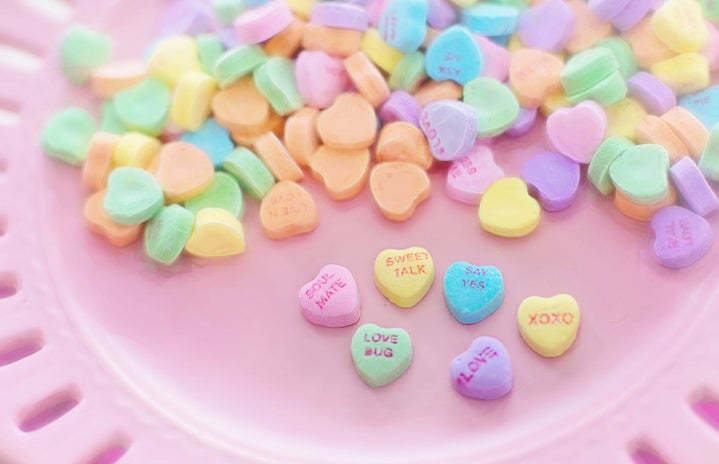Love is in the air, and although many of us hate the stench, there’s no better time than the week of Valentine’s Day to discuss love languages. Non, je ne parle pas le français. If you don’t know what a love language is, here’s a quick rundown. In 1992, Dr. Gary Chapman published The Five Love Languages: How to Express Heartfelt Commitment to Your Mate. As you can gather from the title, Chapman believes that people experience love through one of five different love languages: quality time, words of affirmation, acts of service, receiving gifts and physical touch.
Although the original book was based on romantic relationships, we all know that love extends beyond our partners, and it’s just as important to know your best friend’s love language as it is to know your boyfriend’s or girlfriend’s.
People express and accept love in so many different ways and it’s difficult to put a person into a box, to say that they show love only in one specific way. But spending time really thinking about how both you and your loved ones show love is so important, especially since we rarely ever express we care in the same way as everyone else in our lives. I’ve had lots of discussions with friends about our own love languages recently, and I feel that the way you accept love may not always be the same as the way you show love. Maybe Dr. Gary Chapman seconds this theory, but given my college budget and limited time, I have yet to read his book.
In the past few weeks, I’ve spent a lot of time ruminating on the ways in which I accept and show love to the people in my life and throughout said rumination I believe I’ve confirmed my theory. I’ve always known that quality time is a big one for me. I enjoy just spending time coexisting with the people I love, and I think taking time out of my day to spend with someone is also how I show I care. But I realized recently that words of affirmation might be a close second to quality time for me. Only in the acceptance category though, because ironically, this writer is bad with words. Maybe it’s just because I’m so anxious about what everyone thinks of me all the time. But sometimes it’s nice to hear from my friends that they don’t actually hate me after I’ve spent the last week convinced they were mad because I didn’t wave to them that one time or I was late to a coffee date. And while I normally hate compliments, especially about how I look, I also realized that sometimes you just need to hear you look pretty from that guy you met on Tinder.
Realizing this about myself changed my outlook on the interactions I have with people quite a bit, even just in the last few weeks. I’ve been trying to be more conscious about noticing how my friends show they care about me and accepting what I get from them, even if it may not be something I’d normally consider significant. I think it’s equally important to keep in mind the other person’s love language when you’re trying to show them you care. So, if I have a friend whose love language is Physical Touch, I might try to hug them more often, even if it feels a little weird for me. Often, if you go out of your way to show someone you love them in their love language, they may take notice. So in the case where I hug my friend more often, it will mean even more to my friend who knows I’m not usually a hug initiator.
And while I think it’s important to figure out your loved ones’ love languages, it doesn’t necessarily have to be so cut and dry. You don’t have to label someone as “gift receiver” or “quality time spender.” You can just keep in mind that this person likes to have tangible tokens of your love or that this other person would rather physically hang out with you, even just to run errands, than hear that you want to hang out with them.
But even when you know people’s love languages, it can sometimes be difficult. For instance, my mom is a gift giver. She loves to buy me things out of the blue and loves buying gifts on birthdays and holidays but isn’t much of a gift receiver herself; she prefers acts of service or quality time over a tangible item. And while I usually do show love through acts of service or quality time, sometimes it’s difficult because when I’m receiving physical gifts from her I feel that I have to give her gifts in return. But in typical mom fashion, every time I tell her I wish I wasn’t broke and could give her a nice gift, she always responds with “I’m just happy you’re home for the holidays.” For me, not reciprocating that specific act always feels uneven, and I know this happens with people a lot, especially with those who like to give and receive gifts.
I read a tweet once about a woman and her husband discussing alternative ways to say “I love you.” Her husband wasn’t much of a Words of Affirmation guy; instead, he preferred showing love through Physical Touch. She noticed this about him and suggested they tap each other two times in lieu of saying the words, and suddenly he was doing it all the time. She hadn’t known how often he was thinking it until they started doing the tapping thing. Just like the situation with my mom, this just goes to show you that the most crucial part of any relationship is that we communicate with people about what we want and pay attention to what they want from you in return.
If you aren’t sure which love language you’d fall into, you can take Chapman’s official quiz, and if you’d like to further your reading, feel free to check out this old article I wrote about how to spend Valentine’s Day based on your love language.
Want to see more HCFSU? Be sure to like us on Facebook and follow us on Instagram, Twitter and Pinterest!


